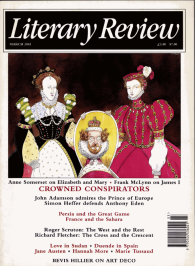Robert Irwin
Percy of Persia
Persia in the Great Game: Sir Percy Sykes, Explorer, Consul, Soldier Spy
By Antony Wynn
John Murray 346pp £25
IN THE LATE nineteenth century a quarter of the world was ruled by Britain. Yet Britain's power extended far beyond the formal empire that was coloured pink on the map. For example, until the First World War Argentina was largely controlled by British companies and financial institutions. The southern and eastern regions of Persia effectively constituted another informal province of the British Empire. The northern part of Persia was under Russian control, and British and Russian proconsuls and officers dictated to the weak shahs who pretended to rule from Tehran. The British Government was not particularly interested in Persia in its own right; British representatives were there because the Russians were. The fear in some quarters was that the Russians might build on their ascendancy in Persia to bully and fight their way to the Indian Ocean and threaten the British possession of India. Most senior officials in London and Delhi seem to have thought the danger exaggerated and therefore advocated a policy of masterly inactivity: the British should sit on their hands while the Russians wasted their resources on a futile attempt to control turbulent mullahs, tribesmen and bandits. However, there were some energetic and powerful promoters of mischievous activity and of a forward British policy in Persia.
George Nathaniel Curzon, Marquess of Kedleston and Viceroy of India, was the most important figure to argue that the British should have a presence in Persia and use it to dish the Russians. Curzon, like most of his subordinates, had a low opinion of the Persians: 'they are consummate hypocrites,

Sign Up to our newsletter
Receive free articles, highlights from the archive, news, details of prizes, and much more.@Lit_Review
Follow Literary Review on Twitter
Twitter Feed
Under its longest-serving editor, Graydon Carter, Vanity Fair was that rare thing – a New York society magazine that published serious journalism.
@PeterPeteryork looks at what Carter got right.
Peter York - Deluxe Editions
Peter York: Deluxe Editions - When the Going Was Good: An Editor’s Adventures During the Last Golden Age of Magazines by Graydon Carter
literaryreview.co.uk
Henry James returned to America in 1904 with three objectives: to see his brother William, to deliver a series of lectures on Balzac, and to gather material for a pair of books about modern America.
Peter Rose follows James out west.
Peter Rose - The Restless Analyst
Peter Rose: The Restless Analyst - Henry James Comes Home: Rediscovering America in the Gilded Age by Peter Brooks...
literaryreview.co.uk
Vladimir Putin served his apprenticeship in the KGB toward the end of the Cold War, a period during which Western societies were infiltrated by so-called 'illegals'.
Piers Brendon examines how the culture of Soviet spycraft shaped his thinking.
Piers Brendon - Tinker, Tailor, Sleeper, Troll
Piers Brendon: Tinker, Tailor, Sleeper, Troll - The Illegals: Russia’s Most Audacious Spies and the Plot to Infiltrate the West by Shaun Walker
literaryreview.co.uk